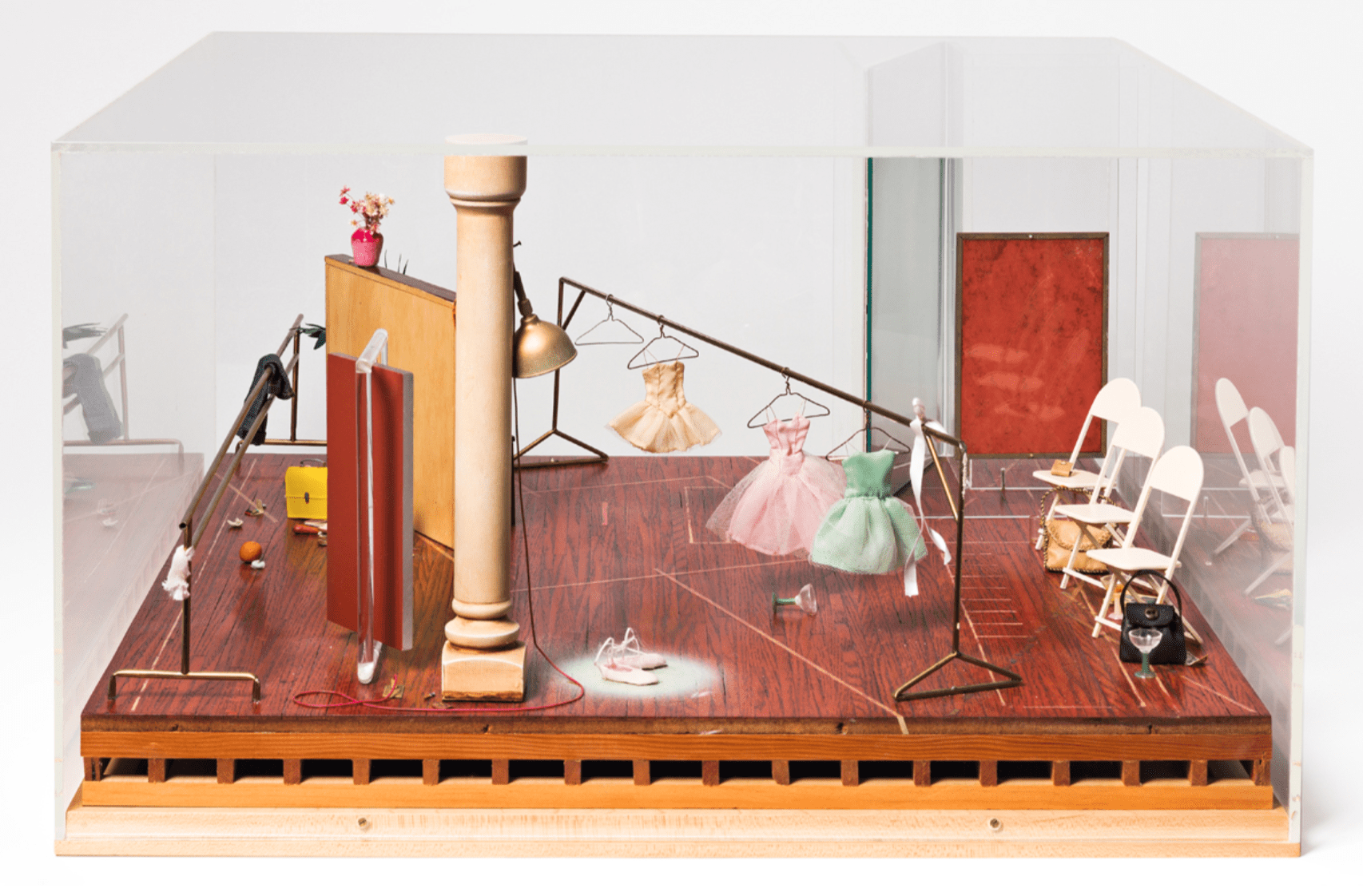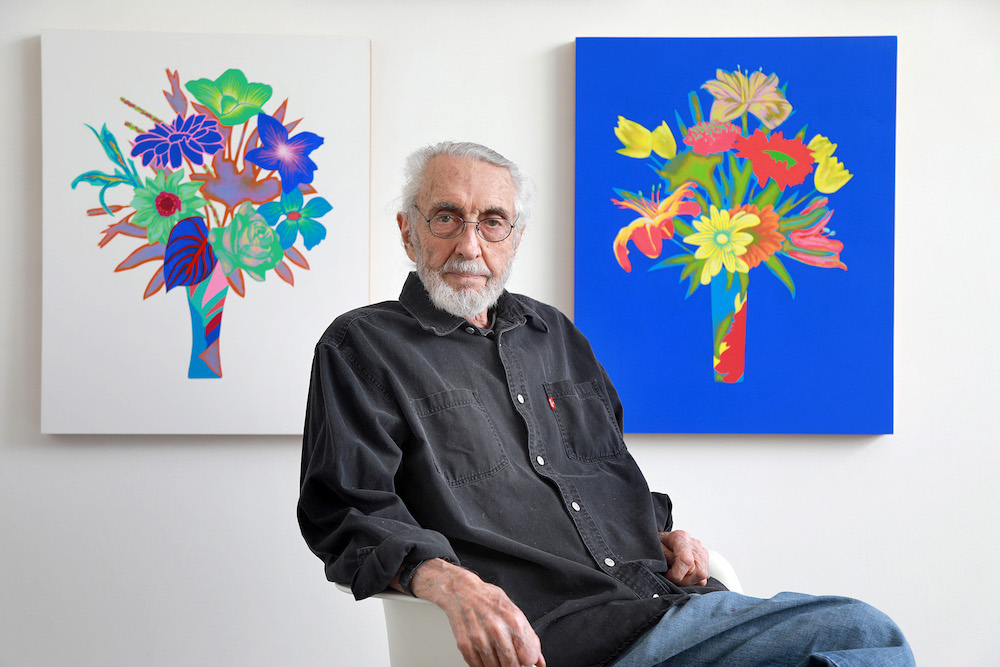We are saddened to announce the death of Roland Reiss, artist and educator, loving husband, father, and grandfather, who passed away on Sunday, December 13, of natural causes in Los Angeles, at his home and studio at The Brewery Artist Lofts. He was 91.
Reiss is widely known for his miniatures but is foremost a painter. An influential and beloved voice in the Los Angeles and Southern California art scene, Reiss exhibited widely throughout his sixty-year career. He was included in the 1975 Whitney Biennial, documenta 7 (1982), and received fourteen solo museum exhibitions, including The Dancing Lessons: 12 Sculptures (1977) at the Los Angeles County Museum of Art. A retrospective at the Begovich Gallery at Cal State Fullerton (2014) highlighted his career of continual self-reinvention, which led to a groundbreaking body of work.
It was a privilege to work with Roland in recent years, and we were thrilled to present four solo exhibitions of his paintings, miniatures, and early works on paper. His earliest work was influenced by Abstract Expressionism, but Reiss brought new plastic materials popular during the 60s in LA into his early paintings. However, the Conceptual art movement of the 70s opened up a new world to him, one where “content” mattered.

Roland Reiss, “Number 9” from The Dancing Lessons: 12 Sculptures, exhibited at Los Angeles County Museum of Art, 1977.
He began to explore human drama in miniature tableaus encased in Plexiglas. Viewers were invited to interpret the myths of modern American culture, from actual murder cases to life in the corporate world by entering a scene frozen in time. Reiss condensed “a complexity of ideas in a single piece.” For the past twenty years, Roland devoted himself almost entirely to floral paintings, working through series as a meditation on the impact of color on consciousness. He described this body of work as an effort to “put everything I have learned about painting into a painting.”
He showed with Cirrus Gallery, Ace Gallery, and Diane Rosenstein in Los Angeles; and with Rena Bransten and Toomey-Tourell Gallery in San Francisco. His miniatures, sculptures, and paintings are included in the permanent collections of Los Angeles County Museum of Art (LACMA), Museum of Contemporary Art, Los Angeles (MOCA), The Hammer Museum, The Whitney Museum of American Art, New York; Orange County Museum of Art (OCMA), Palm Springs Art Museum, Laguna Art Museum, Riverside Art Museum, among others.
Roland Reiss was born May 15, 1929 in Chicago, to Martin and Louise (Strum) Reiss. A self-described “Depression baby,” he moved with his family to Pomona, California during WWII. As a young man, he quickly devoted himself to the study and practice of art, and he was introduced to Millard Sheets, who came to speak to his class at Pomona High School. He attended the American Academy of Art, in Chicago, then returned to Pomona to study art at Mt. San Antonio College. After graduation in 1952, he was drafted into the army during the Korean War. He married Betty Ravenscroft, the mother to his six children, and then was stationed at Camp Roberts, just north of San Luis Obispo. A Sergeant First Class in the US Army, he served as the art director for forty artists working at the base. He painted a mural, which received commendations, and along with Robert Irwin, a fellow GI, he won a national Army art prize. Soon thereafter, his orders to transfer to active combat in Korea were cancelled.
He believed that art saved his life.

Roland Reiss “Domestic Setting,” 2014.
He enrolled at UCLA on the GI Bill, where he met artists Charles Garabedian, Ed Moses, Craig Kauffman, Ray Brown and James McGarrell. He took his graduate degree and MA in art in 1956. While at UCLA, Reiss assisted the artist Rico Lebrun; and was taught by William Brice, Jan Stussy, Stanton McDonald Wright, and Anita Deland. In 1956, he took the position as senior painting teacher at the University of Colorado at Boulder. Here, he brought Clyfford Still to teach for a summer, followed by Richard Diebenkorn, Joan Brown, Nancy Graves, and Hilton Kramer, all who became friends. In the summer of 1966, Roland Reiss and Richard Diebenkorn returned to Westwood, as visiting artists at UCLA.
Roland moved back to California in 1971 and headed the art program at Claremont Graduate University for the thirty years, retiring in 2002. At CGU, he devised a community-centered approach to the grad program, earning it national recognition. After his retirement from CGU, Reiss directed “Paintings Edge,” a summer artist’s residency in Idyllwild from 2000-2007. In 2009 he received the College Art Association Award for the Distinguished Teaching of Art. At CGU he held the Louis and Mildred Benezet Chair in the Humanities and in 2010 an endowed chair in art was established in his name.
In 1991, Roland married artist Dawn Arrowsmith, who was by his side when he passed away. They had been together for thirty-eight years, and their relationship, she says, was ‘a daily love affair.’ He was preceded in death by his father, Martin, his mother, Louise, his daughter Noel, and his son Clinton. He is survived by his wife; his four children, Adam, Nathan, Talya, and Stefan; stepsons Dan and Jim Nielsen, his sister Marilyn Austin; and his grandchildren, Mitchel, Tessa, Annika, Tatum, Freya, Lindsey, Brody, and Blake.
A Celebration of Life will be announced when we can gather again safely.


